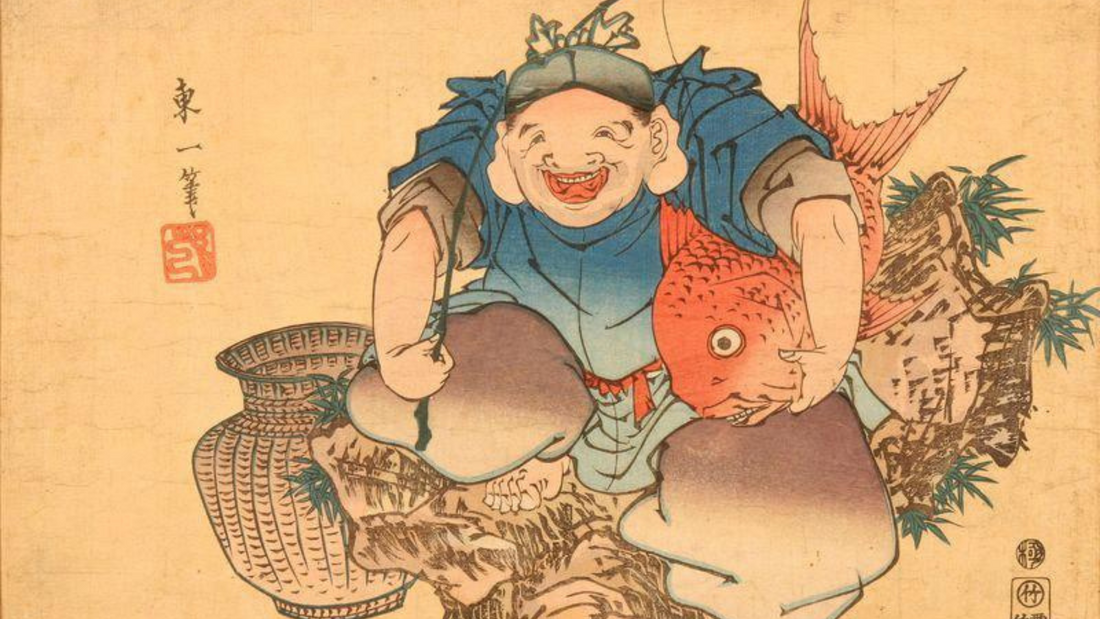As I told you in my previous post, my brand name is linked to a date that is important to me professionally . Indeed, it corresponds to the feast day of Ebisu: the Japanese god of prosperity, good fortune and luck. He is considered the god who protects small traders and artisans .
So I thought it would be a good idea to write a short article to explain to you how this very popular and popular festival takes place in Japan.
Who is the god Ebisu?
Ebisu Festival is a traditional celebration that takes place every year during the month of January in Japan. The festival runs from the evening of January 9 (the day before Ebisu) to January 11 . The main festivities take place on January 10 .
This holiday is in honor of the god Ebisu , the Japanese god of prosperity and fishing. Ebisu is considered one of the Seven Gods of Luck , called Shichifukujin , and is often depicted with a cheerful smile, a straw hat, a fishing rod, and a red sea bream.
Named "Shichifukujin" in Japan, the Seven Gods of Luck are the popular Benzaiten, Bishamonten, Daikokuten, Ebisu, Fukurokuju, Hotei and Jurojin known to all Japanese . Coming from various religious currents, this unique group of deities in the world is prayed to both in the temples and sanctuaries of the archipelago for good luck.
In Japanese, the word 七福神 Shichifukujin can be broken down like this:
- 七 shichi translated the number 7 which is a lucky number;
- 福 fuku means " luck " or "good fortune";
- and 神 jin here takes on the meaning of " divine " or "divinity".
Each profession also has its dedicated protector among the seven deities, each of whom can be prayed to individually or in groups. Here are the Seven Lucky Gods in Japan:
- Benzaiten (弁財天): the goddess of arts, eloquence and scholarship is one of the most popular deities and the only female in the group.
- Bishamonten (毘沙門天): god of war and luck , Bishamonten has its origins in Hinduism and arrived in Japan via China.
- Daikokuten (大黒天): god of wealth, agriculture and provider of food , Daikokuten guarantees abundance and prosperity to the people.
- Hotei (布袋): patron of the economy, philanthropy , satisfaction and good health, Hotei is a semi-legendary Zen monk from Chinese Buddhism and present in the Taoist religion.
- Fukurokuju (福禄寿): divinity of health and longevity , Fukurokuju comes from the Taoist religion.
- Jurojin (寿老人): other god of longevity Coming from Taoism, Jurojin is also drawn in the appearance of a old man with a crane or a suede
- Ebisu (恵比須): god of fishing, agriculture and trade , Ebisu is considered the only purely Japanese deity among the 7 Shichifukujin, with Shinto origins.
In a Japanese society where fish and seafood represent a very special food, Ebisu is one of the Gods of Happiness most honored across the archipelago . In Tokyo, there is also an eponymous district which has made it its emblem. His statue is frequently displayed in shops in Japan because he brings success in business.

How is the Ebisu party on January 10?
The history of Ebisu festival dates back over 400 years, and originated in the city of Osaka . Back then, local fishermen revered Ebisu and held ceremonies to thank him for providing them with a good catch. The holiday then spread across Japan, and is now celebrated in many cities across the country.
Ebisu Festival is a very lively and colorful festival, where people wear traditional clothes, eat local food and participate in festive activities.

Source: My little trip to Kyoto
History and Meaning of Ebisu Festival
The origin of the Ebisu festival dates back to the Edo period (1603-1868), when local fishermen in Osaka began to worship Ebisu for providing them with abundant fishing. The fishermen performed a ceremony for the god, which became an annual tradition. Over time, the celebration spread across Japan, and today is one of the country's most popular holidays.
Ebisu Day celebrations have several meanings. First of all, the festival is an opportunity to thank Ebisu for the prosperity of the past year and to ask for his blessing for the year to come. Second, the holiday is an opportunity to strengthen community bonds, as people come together to celebrate and participate in festive activities.
It is often associated with several rituals and activities , including decorating the home and workplace with symbols of good fortune , such as pine branches and bamboo objects. Fishermen also participate in purification and blessing rituals to ensure abundant fishing for the coming year. Merchants and businesses also offer gifts and snacks to customers and employees as a token of gratitude.

Source: My little trip to Kyoto
Ebisu Festival Traditions and Activities
Here are some of the most popular Ebisu Festival traditions and activities:
-
Bean Throwing : On the first day of the festival, people gather at temples and shrines for "Setsubun", a ceremony in which they throw roasted beans to ward off evil spirits and attract good fortune .
-
Tasting local specialties : During the Ebisu festival, people have the opportunity to taste many local specialties , such as mochi rice cakes and local sake.
-
Fish Head Dance : The fish head dance is a traditional Japanese dance that is often performed during the Ebisu festival. Dancers wear fish masks and colorful clothing and dance to celebrate prosperity and good fortune.
-
Selling lucky charms : During the Ebisu festival, temples and shrines sell lucky charms, such as amulets and omamori, often made from bamboo, which are believed to bring good luck and protection from evil. misfortunes.
-
The float parade : In some towns, a traditional float parade called horenso is organized. The floats are decorated with symbols of good fortune, such as cranes and turtles, and are pulled through the streets by men in traditional costumes.
-
The fishing competition : Fishing is an important activity for the god Ebisu, and during the festival, fishing competitions are held in ports and rivers to celebrate prosperity and wealth.
-
Lion Dance : The lion dance is a traditional Japanese dance that is often performed during the Ebisu festival. Dancers wear lion costumes and dance to bring good fortune and drive away evil spirits.
- The Purification Ritual : During the Ebisu festival, people can participate in purification rituals, such as harae, which involves spiritual purification to get rid of bad luck and attract good fortune.
So there you have it, this one was particularly close to my heart of course, but there are so many Japanese traditions and rituals to discover! Stay tuned, I will present a little bit to you throughout the year, depending on the period.
Is she

